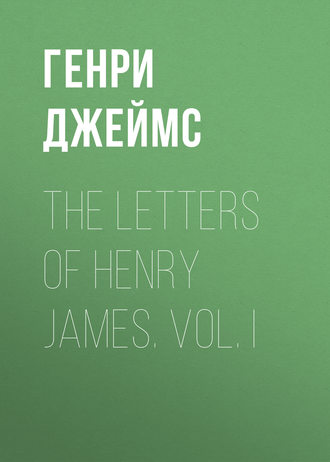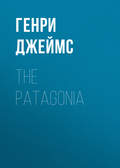
Генри Джеймс
The Letters of Henry James. Vol. I
To Miss Frances R. Morse
H. J.'s admiration for St. Gaudens's memorial to Col. R. G. Shaw, when he afterwards saw it at Boston, found expression, it will be remembered, in The American Scene.
Dictated.
34 De Vere Gardens, W.June 7th, 1897.
My dear Fanny,
I have, as usual, endless unacknowledged benefits to thank you for after too many days. The last is your letter of the end of March, full of interesting substance as always and of things that no one else has the imagination or the inspiration to tell me. (My allusion to the imagination there is not, believe me, an imputation on your exactitude. The light of truth, of good solid vivid Boston truth, shines in each of your pages.) Especially are you interesting and welcome, as I have told you before, I think, on the young generations and full-blown, though new, existences, that are in possession of a scene I knew as otherwise occupied. All the old names—or most of them—appear to be represented by the remote posterity of my old acquaintance. In this remote posterity, however, I take an interest—and scraps and specimens of it, even here, occasionally flash past me....
I have stayed on in town later than for some years past, and though I had, at the end of March, all my plans made to go to Italy, have put it off till so late that, in a few days, I shall have to be content with simply crossing to Paris and seeing then what is to be further done. London is given up to carpenters and seat-mongers—being prepared, on an enormous scale and a rather unsightly way, for the "circus" of the 22nd. The circus is already, amid the bare benches and the mere bousculade of the preparations, a thing to fly from—in spite of the good young George Vanderbilt's having offered me an ample share of a beautiful balcony in Pall Mall to see it from. I shall spend the next few weeks in some place or places, north of the Alps, as yet utterly undefined, and be back in England before the summer is over. The voice of Venice, all this time, has called very loud. But it has been drowned a good deal in the click of the typewriter to which I dictate and which, some months ago, crept into my existence through the crevice of a lame hand and now occupies in it a place too big to be left vacant for long periods of hotel and railway life. All this time I am not coming to the great point, which is my hope that you may have been able to be present (I believe with all my heart of course you were) at the revelation of the Shaw Memorial. In charity, my dear Fanny, if this be the case, do write me a frank word about it. I heard from William and Alice more or less on the eve, but I fear they will have afterwards—just now be having—too much to do to be able to send me many echoes. I daresay that you will, for that matter, already have sent me one. I receive, as it happens, only this morning, a copy of Harper's Weekly with a big reproduction of St. Gaudens's bas-relief, which strikes me as extraordinarily beautiful and noble. How I rejoice that something really fine is to stand there forever for R. G. S.—and for all the rest of them. This thing of St. G.'s strikes me as a real perfection, and I have appealed to William to send me the finest and biggest photograph of it that can be found—for such surely have been taken. How your spiritual lungs must, over it all, have filled themselves with the air of the old wartime. Even here—I mean simply in the depths of one's own being—I myself, for an hour, seem to breathe it again. But the strange thing is that however much, in memory and imagination, it may live for one again, with all its dim figures and ghosts and reverberations and emotions, it appears to belong yet to some far away other world and state of being. I talked of this the other day with Sara Darwin, whose memories are so much identical with my own, and it was a relief to do so—in the absence of all other communications: that absence produced by the up-growth, since, of a whole generation, which began after the end and for which the whole history is as alien as the battles of Alexander. But I am writing you a long letter when I only meant to wave you a hand of greeting and gratitude. Correspondence is rather heavy to me, for I can tackle it only in the margin of time left over after the other matters that my machine has to grind. I hope your summer promises, and in the midst of a peculiar degree, at the present moment, of smoky London stuffiness, I envy you—for I see you in the mind's eye at Beverly—the element of wide verandahs, cut peaches—I mean peaches and cream, you know—white frocks and Atlantic airs. You make me, my dear Fanny, in these high lights, quite incredibly homesick.... Yours very constantly,
HENRY JAMES.
To Mrs. George Hunter
Instead of going abroad for the summer, as he had proposed, H. J. went first to Bournemouth, and from there to join his cousin, Mrs. George Hunter, and her daughters at Dunwich, near Saxmundham.
Bath Hotel, Bournemouth.Saturday [July 3, 1897].
Dearest Elly,
It is an immense satisfaction to get your news—and no figure of speech to say that it has found me literally on the point of reaching out, for it, into the thick twilight of your whereabouts. I have had my general silence much on my conscience—and especially my dumbness and darkness to Rosina and Bay, for whom my movements must have been enveloped in a perfidious mystery that has caused me, I fear, to forfeit all their esteem. But let me tell you first of all how I rejoice in your good conditions and in your having found your feet. It was "borne in" upon me, on general grounds, that Southwold would never do for long, and it is charming that you have found so near and so nice a substitute. I especially delight (without wanting to sacrifice the rest of you) in such a letting-down-easy of the Art-Daughters. Please give them my tender love and tell them that, preposterous as it sounds, I have never, all this time, and in spite of the rosiest asseverations, crossed the channel at all. The nearest I have come to it is to have, early last month, come down here to the edge of the sea and collapsed into the peace and obscurity of this convenient corner (long familiar to me,) which, having a winter season, is practically empty at present. I will tell R. and B. when I see them just how it was that I happened to be so false—it is too long a story now. Suffice it that my reasons (for continuing to hug this fat country) were overwhelming, and my regrets (at not tasting of their brave Bohemia) of the sharpest. Moreover all's well that ends well. If I had gone abroad I should be abroad now and the rest of the summer; and therefore unable to join you on your Suffolk shore—or at least alight upon you there—which is what I shall be enchanted to do. You describe a little Paradise—houris and all; and I beseech you to keep a divan for me there. The only thing is that I fear I shan't be able to come till toward the end—or by the end—of the month. I have more or less engaged myself (to a pair of friends who are coming down here next week for my—strange as it may seem—sweet sake) to remain on this spot till toward the 25th. But I will come then, and stay as long as you will let me. If you can bespeak any quarters for me at the inn, in advance, I will take it very kindly of you. Can they give me a little sitting-room as well as a bed-room? If you can achieve any effective [word illegible] at them to do so I shall be very grateful. I always need some small literary bower other than the British bed-room—and in this case I would of course "meal" there, as that makes them always more zealous. I don't know the East Coast to speak of at all—and I can imagine no more winsome introduction to it. I quite yearn to commune with the young Parisians. Bravo, McMonnies. Bravo everybody—especially Grenville. How I shall joy to frolic with him in the sand! Have they seen—the art-daughters—the image of the St. Gaudens Shaw? It is altogether great. William's oration was a first-class success. I encircle you all and will write again!
Ever, my dear Elly, so constantly yours,
HENRY JAMES.
P.S. The oddest trio of coincidences yesterday afternoon. I was reading the delightful Letters of that peculiarly Suffolk genius (of Woodbridge) Edward FitzGerald ("Omar Khayyam") and, just finishing a story in one of them about his relations with a boatman of Saxmundham (a name—seen for the first time—that struck me—by its strangeness and handsomeness,) laid down the book and went a long walk—five miles along this coast, to where, in a very picturesque and lonely spot, I met a sea-faring man with whom I fraternised.
"Do you belong to this place?"
"Oh no. I've been here five years; but I come from the Suffolk coast—Saxmundham."
"Did you know Mr. FitzGerald?"
"Know him? My brother was his boatman!"—and he tells me the story! Then I walk home and coming in, find your letter on my table. I tear it open and the first word I see in it—in your date—is Saxmundham! Tableau!!! It never rains but it pours!—
To Edward Warren
On returning from Dunwich—it was there that he had been bicycling with Mr. Warren—H. J. heard that Lamb House, which he had seen and admired at Rye the year before, was unexpectedly vacant. He at once appealed to Mr. Warren for professional advice with regard to the condition of the house, and as this proved satisfactory, secured it without delay.
Dictated.
34 De Vere Gardens, W.15th September, 1897.
My dear Edward,
Very kindly read, for me, the enclosed—which throws an odd coincidental light on the very house we talked of, day before yesterday (or was it yesterday?) as we bumped and bounced and vainly shifted sides. The place in question is none other than the mansion with the garden-house perched on the wall; and though to be fairly confronted with the possibility and so brought to the point is a little like a blow in the stomach, what I am minded to say to you is that perhaps you may have a chance to tell me, on Friday, that you will be able to take some day next week to give me the pleasure of going down there with me for a look. I feel as if I couldn't think on the subject at all without seeing it—the subject—again; and there would be no such seeing it as seeing it in your company. Perhaps I shall have speech of you long enough on Friday to enable us to settle a day. I should be capable of Monday. I hope you slid gently home and are fairly on all fours—that is on hands and feet—again. What a day we should have had again also—I mean this one—if we had kept it up! But basta così!—it does beautifully for your journey. A thousand friendships to Margaret. Always yours,
HENRY JAMES.
To Arthur Christopher Benson
The following refers to a manuscript diary of Mr. Benson's and to the privately printed Letters and Journals of William Cory, author of Ionica.
34 De Vere Gardens, W.September 25th, 1897.
My dear Arthur,
Send me by all means the Diary to which you so kindly allude—nothing could give me greater pleasure than to feel I might freely—and yet so responsibly—handle it. I hope it contains a record of your Hawarden talk—of which you speak.
I shall be very glad indeed of a talk with you about W. Cory—my impression of whom, on the book, you deepen—whenever anything so utterly unlikely as articulate speech between us miraculously comes to pass.—I am just drawing a long breath from having signed—a few moments since—a most portentous parchment: the lease of a smallish, charming, cheap old house in the country—down at Rye—for 21 years! (One would think I was your age!) But it is exactly what I want and secretly and hopelessly coveted (since knowing it) without dreaming it would ever fall. But it has fallen—and has a beautiful room for you (the "King's Room"—George II's—who slept there;) together with every promise of yielding me an indispensable retreat from May to October. I hope you are not more sorry to take up the load of life that awaits, these days, the hunch of one's shoulders than I am. You'll ask me what I mean by "life." Come down to Lamb House and I'll tell you. And open the private page, my dear Arthur, to yours very eagerly,
HENRY JAMES.
To Mrs. William James
Dictated.
34 De Vere Gardens, W.1st December, 1897.
Dearest Alice,
It's too hideous and horrible, this long time that I have not written you and that your last beautiful letter, placed, for reminder, well within sight, has converted all my emotion on the subject into a constant, chronic blush. The reason has been that I have been driving very hard for another purpose this inestimable aid to expression, and that, as I have a greater loathing than ever for the mere manual act, I haven't, on the one side, seen my way to inflict on you a written letter, or on the other had the virtue to divert, till I should have finished my little book, to another stream any of the valued and expensive industry of my amanuensis. I have, at last, finished my little book—that is a little book, and so have two or three mornings of breathing-time before I begin another. Le plus clair of this small interval "I consecrate to thee!"
I am settled in London these several weeks and making the most of that part of the London year—the mild, quiet, grey stretch from the mid-October to Christmas—that I always find the pleasantest, with the single defect of its only not being long enough. We are having, moreover, a most creditable autumn; no cold to speak of and almost no rain, and a morning-room window at which, this December 1st, I sit with my scribe, admitting a radiance as adequate as that in which you must be actually bathed, and probably more mildly golden. I have no positive plan save that of just ticking the winter swiftly away on this most secure basis. There are, however, little doors ajar into a possible brief absence. I fear I have just closed one of them rather ungraciously indeed, in pleading a "non possumus" to a most genial invitation from John Hay to accompany him and his family, shortly after the new year, upon a run to Egypt and a month up the Nile; he having a boat for that same—I mean for the Nile part—in which he offers me the said month's entertainment. It is a very charming opportunity, and I almost blush at not coming up to the scratch; especially as I shall probably never have the like again. But it isn't so simple as it sounds; one has on one's hands the journey to Cairo and back, with whatever seeing and doing by the way two or three irresistible other things, to which one would feel one might never again be so near, would amount to. (I mean, of course, then or never, on the return, Athens, Corfu, Sicily the never-seen, etc., etc.) It would all "amount" to too much this year, by reason of a particular little complication—most pleasant in itself, I hasten to add—that I haven't, all this time, mentioned to you. Don't be scared—I haven't accepted an "offer." I have only taken, a couple of months ago, a little old house in the country—for the rest of my days!—on which, this winter, though it is, for such a commodity, in exceptionally good condition, I shall have to spend money enough to make me quite concentrate my resources. The little old house you will at no distant day, I hope, see for yourself and inhabit and even, I trust, temporarily and gratuitously possess—for half the fun of it, in the coming years, will be occasionally to lend it to you. I marked it for my own two years ago at Rye—so perfectly did it, the first instant I beheld it, offer the solution of my long-unassuaged desire for a calm retreat between May and November. It is the very calmest and yet cheerfullest that I could have dreamed—in the little old, cobble-stoned, grass-grown, red-roofed town, on the summit of its mildly pyramidal hill and close to its noble old church—the chimes of which will sound sweet in my goodly old red-walled garden.
The little place is so rural and tranquil, and yet discreetly animated, that its being within the town is, for convenience and immediate accessibility, purely to the good; and the house itself, though modest and unelaborate, full of a charming little stamp and dignity of its period (about 1705) without as well as within. The next time I go down to see to its "doing up," I will try to have a photograph taken of the pleasant little old-world town-angle into which its nice old red-bricked front, its high old Georgian doorway and a most delightful little old architectural garden-house, perched alongside of it on its high brick garden-wall—into which all these pleasant features together so happily "compose." Two years ago, after I had lost my heart to it—walking over from Point Hill to make sheep's eyes at it (the more so that it is called Lamb House!)—there was no appearance whatever that one could ever have it; either that its fond proprietor would give it up or that if he did it would come at all within one's means. So I simply sighed and renounced; tried to think no more about it; till at last, out of the blue, a note from the good local ironmonger, to whom I had whispered at the time my hopeless passion, informed me that by the sudden death of the owner and the preference (literal) of his son for Klondyke, it might perhaps drop into my lap. Well, to make a long story short, it did immediately drop and, more miraculous still to say, on terms, for a long lease, well within one's means—terms quite deliciously moderate. The result of these is, naturally, that they will "do" nothing to it: but, on the other hand, it has been so well lived in and taken care of that the doing—off one's own bat—is reduced mainly to sanitation and furnishing—which latter includes the peeling off of old papers from several roomfuls of pleasant old top-to-toe wood panelling. There are two rooms of complete old oak—one of them a delightful little parlour, opening by one side into the little vista, church-ward, of the small old-world street, where not one of the half-dozen wheeled vehicles of Rye ever passes; and on the other straight into the garden and the approach, from that quarter, to the garden-house aforesaid, which is simply the making of a most commodious and picturesque detached study and workroom. Ten days ago Alfred Parsons, best of men as well as best of landscape-painters-and-gardeners, went down with me and revealed to me the most charming possibilities for the treatment of the tiny out-of-door part—it amounts to about an acre of garden and lawn, all shut in by the peaceful old red wall aforesaid, on which the most flourishing old espaliers, apricots, pears, plums and figs, assiduously grow. It appears that it's a glorious little growing exposure, air, and soil—and all the things that were still flourishing out of doors (November 20th) were a joy to behold. There went with me also a good friend of mine, Edward Warren, a very distingué architect and loyal spirit, who is taking charge of whatever is to be done. So I hope to get in, comfortably enough, early in May. In the meantime one must "pick up" a sufficient quantity of ancient mahogany-and-brass odds and ends—a task really the more amusing, here, where the resources are great, for having to be thriftily and cannily performed. The house is really quite charming enough in its particular character, and as to the stamp of its period, not to do violence to by rash modernities; and I am developing, under its influence and its inspiration, the most avid and gluttonous eye and most infernal watching patience, in respect of lurking "occasions" in not too-delusive Chippendale and Sheraton. The "King's Room" will be especially treated with a preoccupation of the comfort and aesthetic sense of cherished sisters-in-law; King's Room so-called by reason of George Second having passed a couple of nights there and so stamped it for ever. (He was forced ashore, at Rye, on a progress somewhere with some of his ships, by a tempest, and accommodated at Lamb House as at the place in the town then most consonant with his grandeur. It would, for that matter, quite correspond to this description still. Likewise the Mayors of Rye have usually lived there! Or the persons usually living there have usually become mayors! That was conspicuously the case with the late handsome old Mr. Bellingham, whose son is my landlord. So you see the ineluctable dignity in store for me.) But enough of this swagger. I have been copious to copiously amuse you.
Your beautiful letter, which I have just read over again, is full of interest about you all; causing me special joy as to what it says of William's present and prospective easier conditions of work, relinquishment of laboratory, refusal of outside lectures, etc., and of the general fine performance, and promise, all round, of the children. What you say of each makes me want to see that particular one most.... I had a very great pleasure the other day in a visit, far too short—only six hours—from dear old Howells, who did me a lot of good in an illuminating professional (i.e. commercial) way, and came, in fact, at quite a psychological moment. I hope you may happen to see him soon enough to get from him also some echo of me—such as it may be. But, my dear Alice, I must be less interminable. Please tell William that I have two Syracuse "advices," as yet gracelessly unacknowledged—I mean to him—to thank him for. It's a joy to find these particular months less barren than they used to be. I embrace you tenderly all round and am yours very constantly,
HENRY JAMES.






